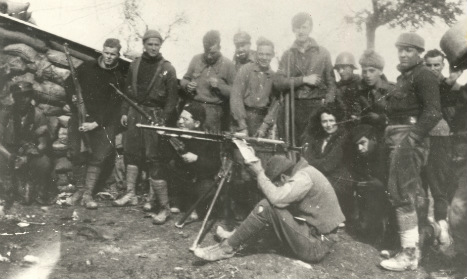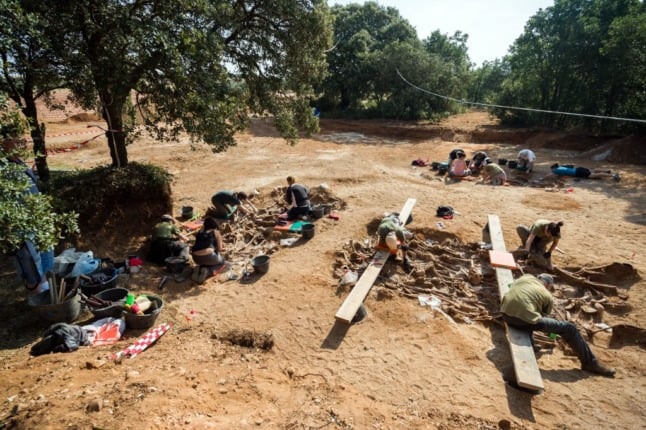The death of 22-year-old Dean Carl Evans, the second British man to be killed fighting the Islamic State in Syria after Konstandinos Erik Scurfield was killed last year, should prompt us to wonder why he and others would choose to travel to the frontline and involve themselves in the bloody civil war of a country other than their own.
Trying to understand the motivations of foreign fighters such as Evans has invited historical comparisons, particularly with the International Brigades in the Spanish Civil War. Richard Baxell, historian of the British Battalion of the International Brigades, has argued against making generalisations about their motivations. Suggestions of ideological naivety or extremism alone can be particularly misleading.
Journalist George Monbiot has used the history of the International Brigades to argue against prosecuting returnees from Syria. But to understand the problems faced by those returning from both conflicts revolves around not just why they fought, but who they fought for.

Dean Carl Evans, 22, from Berkshire, who was killed fighting alongside the Kurdish YPG. Ragihandina YPG
How history judges
Few of those volunteering for the International Brigades had any understanding of the situation in Spain which led to Franco’s coup in July 1936. Most were working-class activists motivated by anti-fascism, not Stalinist stooges. Equally, those volunteering for Franco had little idea of the politics in Spain, and typically went for adventure, not anti-communism. The war in Spain was seen by those who went not as a domestic civil conflict, but part of a growing global war against fascism – or communism.
Perhaps the most famous of those that fought in Spain is George Orwell. For the eight months he was in Spain, Orwell didn’t fight with the International Brigades but instead with POUM, a tiny anti-Stalinist militia that he joined largely by chance. Later, intending to join the larger International Brigades, he was instead caught up in fighting in Barcelona in 1937 between his comrades and Stalinist factions – supposedly fighting on the same side against Franco. Disillusioned, he left the country.
Reflecting on his time in Spain, he wrote in his memoir Homage to Catalonia that in retrospect he would rather have joined the anarchist militias than either of the other groups. Not out of political sympathies, but because they were the largest force in Catalonia where he fought. Orwell, like others, wanted to travel to Spain because of its international significance, but even he had little idea how things would play out on the ground when he arrived.
The same is true in Syria. Those supposedly motivated by radical Islam do not necessarily fight for ISIS, but can end up in a range of different Sunni- and Shia-led rebel groups. As was the case for those like Orwell en route to Spain, the different paths volunteers take into Syria can affect which organisation they join.
Most volunteers from the West fighting in Syria against Islamic State are ex-servicemen, often informed by experiences in Afghanistan or Iraq. Others certainly are adventurers and are motivated by the thrill of danger. Most travel individually or in small groups, rather than through organised recruitment networks.
In fact a commitment to fight radical Islam is perhaps the only unifying feature of these Western volunteers. Most, like Evans and Scurfield, end up in the Kurdish YPG, People’s Protection Units, which openly welcomes Western recruits. Recruits are often unaware of the domestic politics of the region they are entering. Those motivated by more conservative or right-wing anti-Islamic views find themselves increasingly at odds with the radical Kurdish leftists in the YPG – with the result that many leave.
Our view of the war is shaped by those aspects that become most visible through the media. The YPG are the best-known rebel group fighting ISIS in Syria, partly due to the deaths of the two Britons fighting for them. The anxiety over the intentions of returning volunteers of a Muslim background gives this aspect prominence. Together this reinforces the idea of a war where combatants are either for or against Islam, rather than the far more complex reality of Middle Eastern and international politics.
Orwell returned from Spain in 1937, but the civil war raged until 1939. In Homage to Catalonia, Orwell to some extent punctured the myth that the conflict was merely the ideological fight against fascism – for some it was the fight against communism, documenting the complexities of Spanish politics and the strife that flared between groups supposedly fighting on the same side. Ironically, by the time of the book’s publication in 1938, the world did indeed face a fight against fascism with the rise of Nazism in Germany leading Europe into World War II.
As noted by writer Michael Petrou, it is the failure of international powers to intervene that has led to the war in Syria, just as non-intervention facilitated the rise of Franco. The desire of individuals to act when presented with the inaction of the international community explains the allure of the conflict to idealists, mercenaries and adventurers alike.
By Michael Lambert, PhD Researcher, Lancaster University
Michael Lambert is affiliated with the International Brigades Memorial Trust in Britain and the Asociación para la Recuperación de la Memoria Histórica in Spain.
This article was originally published on The Conversation. Read the original article.




 Please whitelist us to continue reading.
Please whitelist us to continue reading.
Member comments